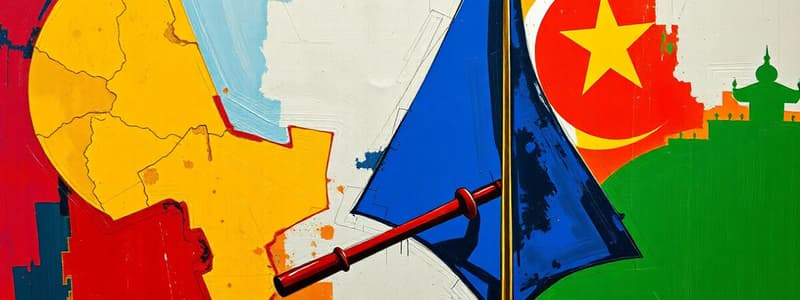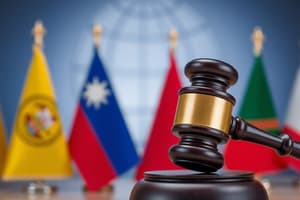Podcast
Questions and Answers
What does a privilege allow a diplomat to do?
What does a privilege allow a diplomat to do?
- Engage in illegal activities
- Ignore international treaties
- Be exempt from paying income tax in the host state (correct)
- Avoid diplomatic dialogues
Immunities mean that individuals are protected from illegal actions by the host state.
Immunities mean that individuals are protected from illegal actions by the host state.
False (B)
What document governs the privileges and immunities of states?
What document governs the privileges and immunities of states?
Vienna Convention on Diplomatic Relations (1961)
A/an ______ allows diplomats to fulfill their functions by providing necessary legal protections.
A/an ______ allows diplomats to fulfill their functions by providing necessary legal protections.
Match the following terms with their definitions:
Match the following terms with their definitions:
What is the primary reason for International Organizations' (IO) absolute immunity?
What is the primary reason for International Organizations' (IO) absolute immunity?
International Organizations are required to address human rights infringements in their operations.
International Organizations are required to address human rights infringements in their operations.
What case exemplifies harm caused by UN peacekeepers?
What case exemplifies harm caused by UN peacekeepers?
If an IO does not willingly comply, it can _____ its immunity to promote justice.
If an IO does not willingly comply, it can _____ its immunity to promote justice.
Match the following concepts to their descriptions:
Match the following concepts to their descriptions:
What type of acts does a state have immunity for?
What type of acts does a state have immunity for?
States have absolute immunity for all of their actions.
States have absolute immunity for all of their actions.
In which case did the ICJ rule that state immunity could not be dismissed in instances of human rights violations?
In which case did the ICJ rule that state immunity could not be dismissed in instances of human rights violations?
Diplomats and consular staff have ______ immunity in relation to their official functions.
Diplomats and consular staff have ______ immunity in relation to their official functions.
Match the following terms with their definitions:
Match the following terms with their definitions:
According to the rulings, when is a minister shielded by personal immunity?
According to the rulings, when is a minister shielded by personal immunity?
Immunities for diplomats are granted solely for their personal benefit.
Immunities for diplomats are granted solely for their personal benefit.
What does the principle of 'par in parem non habet imperium' translate to?
What does the principle of 'par in parem non habet imperium' translate to?
What does the ICJ 'DRC v Rwanda' case illustrate about jurisdiction in relation to jus cogens norms?
What does the ICJ 'DRC v Rwanda' case illustrate about jurisdiction in relation to jus cogens norms?
Immunity can be circumvented for civil claims related to torture against foreign state officials.
Immunity can be circumvented for civil claims related to torture against foreign state officials.
What happens to a minister's immunity after they cease to hold their position?
What happens to a minister's immunity after they cease to hold their position?
A former ambassador retains immunity only for __________ acts done while in office.
A former ambassador retains immunity only for __________ acts done while in office.
According to the UK House of Lords in the 'Pinochet' case, can committing a crime be part of the functions of a head of state?
According to the UK House of Lords in the 'Pinochet' case, can committing a crime be part of the functions of a head of state?
There has been a move toward absolute immunity for heads of state according to the recent law.
There has been a move toward absolute immunity for heads of state according to the recent law.
What is considered a jus cogens norm in international law?
What is considered a jus cogens norm in international law?
Match the listed cases or concepts with their relevant statements:
Match the listed cases or concepts with their relevant statements:
What is the primary purpose of the privileges and immunities of International Organizations (IOs)?
What is the primary purpose of the privileges and immunities of International Organizations (IOs)?
International Organizations have complete immunity from local laws.
International Organizations have complete immunity from local laws.
What article of the UN Charter addresses the privileges and immunities of International Organizations?
What article of the UN Charter addresses the privileges and immunities of International Organizations?
The 1946 UN Convention exempts the UN from local ______ and customs.
The 1946 UN Convention exempts the UN from local ______ and customs.
Match the following articles to their respective provisions regarding the UN's privileges and immunities:
Match the following articles to their respective provisions regarding the UN's privileges and immunities:
Which agreement supplements the 1946 UN Convention and was entered into with the host states?
Which agreement supplements the 1946 UN Convention and was entered into with the host states?
The UN can waive its own immunity if it chooses to do so.
The UN can waive its own immunity if it chooses to do so.
What must host state authorities obtain to enter an International Organization's premises?
What must host state authorities obtain to enter an International Organization's premises?
Flashcards are hidden until you start studying
Study Notes
Privileges and Immunities in General
- Privilege exempts one from a rule
- Immunity shields one from legal action
Privileges and Immunities of States
- The rules on P&I are some of the oldest in international law
- Codified in the 1961 Vienna Convention on Diplomatic Relations
- Purpose: allowing diplomatic missions to fulfil their functions
- Diplomatic protection is founded on the principle of reciprocity
State Immunity
- State is immune for all state acts (jure imperii)
- Reason: equals have no sovereignty over each other (‘par in parem non habet imperium’)
- State immunity is a rule of PIL
- State immunity is restricted rather than absolute
Diplomats and Consular Staff
- Heads of state through to ambassador in office have absolute immunity
- This immunity is not granted for their personal benefit, but to ensure the effective performance of their functions
- Ministers remain immune even for acts committed before becoming minister
- Immunity may not be circumvented even in cases of gross violations of international human rights or international humanitarian law
- ICJ: such immunity should not equal impunity → justice should be served in minister’s home state’s courts.Or home state should waive his immunity.
- Once minister ceases to hold the position, immunity becomes more limited (‘functional’)
- Same people out of office remain immune only for all official acts done while in office
Privileges and Immunities of International Organizations
- Art. 105 UN Charter: privileges and immunities of the IO are necessary for the effective exercise of its functions and the fulfilment of its purposes
- Principles & rules on IO immunities typically reflect those of states.
- Immunity from local courts’ jurisdiction does not mean that local law doesn’t apply to IOs.
- IO-host state relationships are not governed by a general treaty such as for state immunity.
United Nations
- Art. 105(3) UNC → General Assembly adopted the General Convention on Privileges and Immunities of the UN (1946)
- UN enjoys absolute immunity
- UN's property, assets, premises, archives, etc. are immune from legal action
- UN can waive its own immunity
- UNGA has called on member states to criminalize behavior of their nationals serving the UN and committing crimes
- As we realize that IO’s work and operations sometimes adversely affect millions of people, IO’s immunity from lawsuit (only necessary to exercise its functions) has become increasingly controversial.
- Risk: if UN would continue to push responsibility to troop-contributing nations the latter may become reluctant to contribute troops in the future
Studying That Suits You
Use AI to generate personalized quizzes and flashcards to suit your learning preferences.




